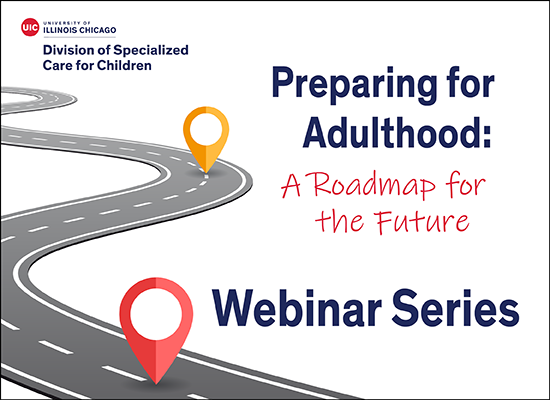Webinar Series to Help Families, Caregivers and Youth Navigate the Transition to Adulthood

Learn practical strategies and tools to plan for the transition to adulthood during our free two-part series
Families can face new challenges and shifting roles as young people move toward adulthood.
Join the Division of Specialized Care for Children (DSCC) to learn more about navigating this journey during our free “Preparing for Adulthood: A Roadmap for the Future” webinar series.
The two-part series will feature Claire Cook, DSCC Title V Transition Specialist, and Suzanne Aaron, Northern Illinois Outreach Specialist for Illinois Life Span.
The sessions will cover:
- “Session One: Navigating Adult Systems,” June 26 at 6 p.m.
This session is for youth ages 12 to 15 and their families. Families with children at other developmental stages are also welcome to attend.
This session will provide practical tools for exploring and understanding adult systems, such as health care, education, employment and more. It will also cover strategies for balancing independence and guidance as family roles evolve.
- “Session Two: Empowering Parents and Caregivers,” July 31 at 6 p.m.
Session two is for parents, caregivers and families of youth ages 16 and older with complex needs and/or disabilities.
Building on session one, participants will dive deeper into adult guardianship, health insurance, benefits and programs for youth with complex needs. The session will focus on creating meaningful daily routines while managing evolving family dynamics. It will also explore the role of support circles and how to make decisions that support youth and caregivers in the long run.
- “Primera sesión: Recorrer los sistemas de los adultos,” 26 de junio a las 6 p. m.
Esta sesión es para padres, cuidadores, familias y jóvenes de 12 a 15 años. Las familias de jóvenes en otras etapas de desarrollo también son bienvenidas.
- “Segunda sesión: Empoderar a los padres y cuidadores,” 31 de julio a las 6 p.m.
Según la primera sesión, este seminario web se centrará en tutela de adultos, seguro médico, beneficios y programas para jóvenes con necesidades complejas, crear rutinas diarias importantes mientras se maneja la dinámica familiar en evolución y la función de los círculos de apoyo y cómo tomar decisiones que apoyen a los jóvenes y a los cuidadores a largo plazo. Esta sesión ofrecerá a las familias conocimientos y estrategias adaptadas a sus retos únicos.
Each presentation will be in English. Live Spanish interpretation will be available.
The recordings and slides for both sessions will be available on our Family Education Webinars page.
If you have questions about the series, please contact Claire Cook at clairer3@uic.edu or (800) 322-3722.
Please spread the word and plan to join us!
New Law Empowers Adults With Disabilities to Make Their Own Choices

The Supported Decision-Making Act takes effect Feb. 27 and allows individuals with disabilities to make decisions with help from trusted supporters
When making decisions, we all rely on help and advice to choose what’s right for us.
A new Illinois law ensures people with disabilities can get the help they need to make decisions for their own lives.
The Supported Decision-Making Act empowers individuals with disabilities to make their own choices with the right support. It takes effect on Feb. 27.
Research shows that when persons with disabilities have more control over their lives, they experience better health and wellbeing. However, many persons with disabilities have faced unnecessary and restrictive guardianships once they turn 18 simply because of their disability.
Supported decision-making is an alternative to guardianship. It allows individuals with disabilities to identify a supporter. This supporter can help interpret information, weigh options and help communicate the person’s decisions in certain areas as needed.
These areas can include:
- Where to live
- Medical care or counseling
- Money
- Work
- School
- Public benefits and more
An identified supporter is someone the person with disabilities knows and trusts. It can be:
- A friend
- A family member
- A co-worker or colleague
- A person with professional skills
Under the act, the person with disabilities fills out a Supported Decision-Making Agreement. The agreement identifies the supporter and what areas the person with disabilities needs support with.
This agreement ensures that the person with disabilities makes decisions and not the identified supporter.
This process promotes self-sufficiency and control for individuals with disabilities.
Illinois is among several states that have supported decision-making laws in place.
The Illinois Guardianship and Advocacy Commission has many resources to explain the new Supported Decision-Making Act. These include:
- Supported Decision-Making Fact Sheet
- Supported Decision-Making Frequently Asked Questions
- Supported Decision-Making Training for Persons With Disabilities
Family Matters Parent Training & Information Center is also hosting an upcoming webinar on the Supported Decision-Making Act.
The presentation will provide an overview of the law. It will also review the contents of a Supported Decision-Making Agreement and share examples of how supported decision-making works.
The “Supported Decision-Making in Illinois: What Is It and How Does It Work?” webinar will take place at 11 a.m. Feb. 22.
Additional resources on supported-decision making are available in the Guardianship and Alternatives section of our Transition Tools.


